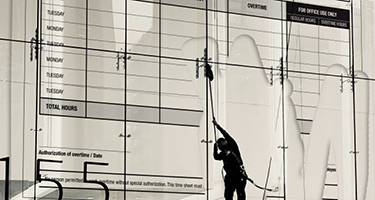As it did for uncountable numbers of professionals, the pandemic necessitated an unprecedented shift to remote work for lawyers across the country. Although this fundamentally changed the way lawyers practice and had a variety of adverse consequences, the past 18 months—as evidenced by the fact that many law firms had record revenue in 2020—have demonstrated that lawyers can work productively from home.
Clearly, remote work is here to stay, and the pre-pandemic norm of full-time office work will not be nearly as commonplace going forward. The lessons learned during this difficult period present a unique opportunity for firms to revamp earlier policies to provide real workplace flexibility, ensure that those who work remotely can advance and create a more hospitable culture for women that will stem their disproportionately high rate of attrition.
As offices reopen, we’ll be able to see in real time whether leaders of law firms merely pay lip service to hybrid work policies or if they’ll actually support them. Before the pandemic, only around seven percent of lawyers used flex- or part-time policies, the vast majority of them women with children. The reason so few attorneys did so is these policies didn’t provide a clear path to career advancement. Women who worked on part-time or flexible schedules were rarely promoted to partner, were often overlooked and were incorrectly perceived as insufficiently committed to their firm and their career.
It’s now imperative that law firms finally implement effective hybrid-work policies. Practicing Law in the Pandemic and Moving Forward, a report I coauthored with my colleague Stephanie Scharf, found that the overwhelming majority of young lawyers, particularly women and those of color, want to be able to decide for themselves how often they’ll work in the office, and a recent American Lawyer survey of midlevel associates found that 78 percent prefer a hybrid work schedule. Similarly, a Major, Lindsey & Africa study found both a generational and gender divide, as more than three times as many partners as associates are “very eager” to return to the office, and 20 percent more men than women are “eager” or “very eager” to do so.
Given the strong preference for hybrid schedules among younger lawyers, who comprise higher percentages of women and minorities, failure to offer meaningful flexibility will result in many of them leaving their firms for others that offer such latitude. The competition for talent is fierce, and many younger lawyers are eschewing promises of higher pay to search for greater workplace flexibility and work-life balance.
The Need for Effective Hybrid Policies
The pandemic has caused many female lawyers to leave their firms. A recent study by Law360 found that in 2020, women made up 42 percent of departing attorneys and 29 percent of departing partners; women of color were 13 percent of departing attorneys overall—percentages higher than their representation in law firms.
The experience of the last year and a half has also led to increased reluctance among women to return to five days a week in the office, undoubtedly attributable to the considerable stress and anxiety of the pandemic. Our Practice Forward Survey found that female lawyers with young children were far more likely than men to have had an increase in child-care responsibilities, their workday disrupted more often by family and household obligations, and fewer hours in the day to manage their workload. As a result, women lawyers were more concerned about their evaluations, advancement and compensation—and complained of being overlooked for assignments and client opportunities.
Our survey also found that 53 percent of women with children age five or younger, and 41 percent of those with kids age six to 13, were considering working part-time. The Practice Forward Survey also found that 52 percent of female lawyers feel stress at work on account of their gender, compared to just nine percent of men. Moreover, as the Delta variant rages nationwide, lawyers with young children are understandably concerned about the safety of their unvaccinated children if they return to the office.
Best Practices for Hybrid Work Policies
1. Leaders must be intentional in implementing them.
Law firms’ top brass need to develop hybrid work policies based on input from the lawyers most likely to use them. Too often, leaders devise policies without first getting perspective and suggestions from the lawyers most affected. There’s a consequent lack of buy-in among younger lawyers, and the policies fail to account for the problems they confront.
Leaders also need to embrace and promote their hybrid policies. They can serve as role models by themselves working on a hybrid basis, empathetically communicating their endorsement of remote work and recognizing the successes of lawyers who work remotely. Department chairs and practice-group leaders must ensure that lawyers who work from home remain connected with their team and office colleagues—and have opportunities for social interaction, training, mentoring and business development.
2. Use metrics to assess how well these policies are working.
Who is taking advantage of hybrid work? How often do lawyers work that way? Measure it. Assignments and client opportunities for lawyers who work from home must be monitored to determine whether they’re getting the necessary experience to advance. Performance evaluations should be scrutinized to spot any implicit bias and determine whether remote-work lawyers are being unfairly criticized about their commitment to the firm or their effectiveness. Most importantly, firms must track how many lawyers who do hybrid work are being promoted to partnership.
3. Develop policies to maintain increased engagement and ensure that firm culture is inclusive of everyone.
When lawyers work remotely, it’s important that they don’t feel left out or sidelined. Firms must therefore take creative steps to ensure that these lawyers don’t end up “out of sight, out of mind.” To foster an inclusive culture, certain days each month can be designated for in-person meetings of practice groups, departments or the entire office. In-person or virtual social events can also promote social interaction, camaraderie, and morale. Firms can arrange one-on-one calls or other “pulse checks” to discuss how lawyers are faring and what the firm can do to help them succeed.
Conclusion
Whether firms will recognize the need for truly effective hybrid work policies has long been an open question. They must now seize this unique opportunity to implement such policies that go beyond the level of mere hype. If they fail to do so, they’ll see an even greater exodus of women, whose recruitment and training entail considerable time and expense, and will find themselves at a competitive disadvantage in the war for talent and clients, who are increasingly demanding that women be assigned to handle and lead their legal matters.
Roberta “Bobbi” Liebenberg is a senior partner at Fine, Kaplan and Black, where she focuses her practice on antitrust class actions and other complex commercial litigation. She is a former chair of the American Bar Association Commission on Women in the Profession and is also a principal at the Red Bee Group, a women-owned consulting firm that uses data-based strategies to attain DEI objectives.





























